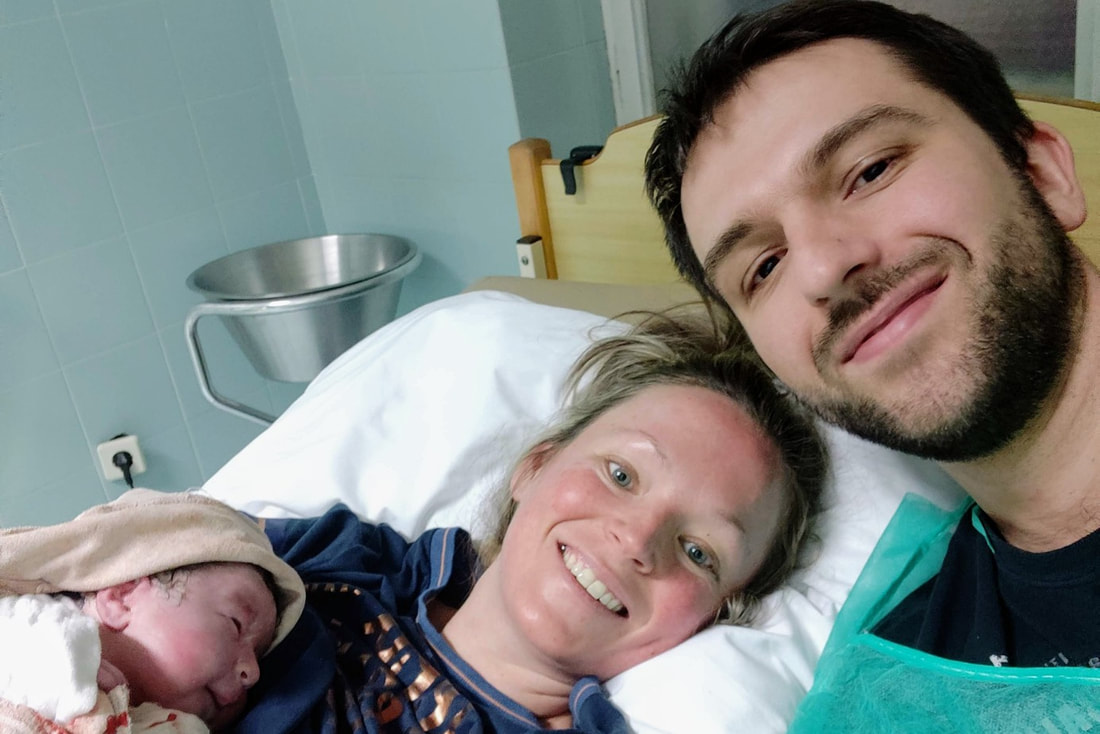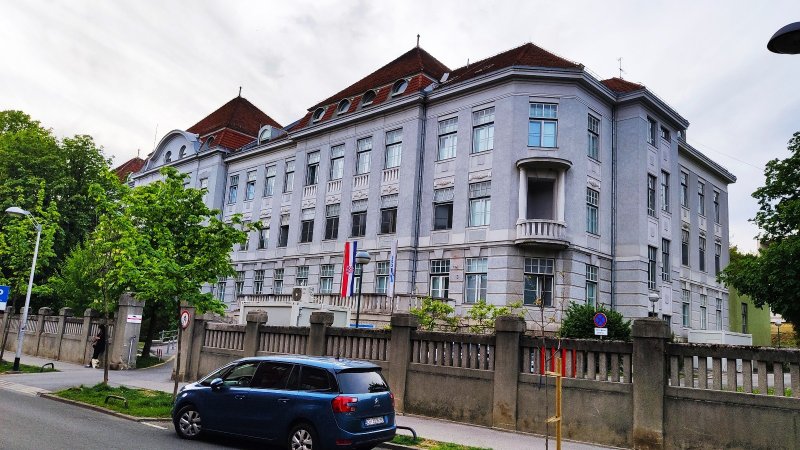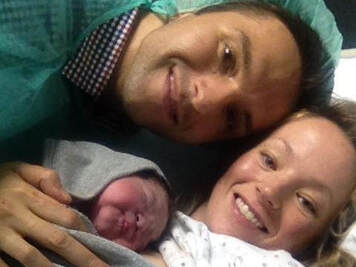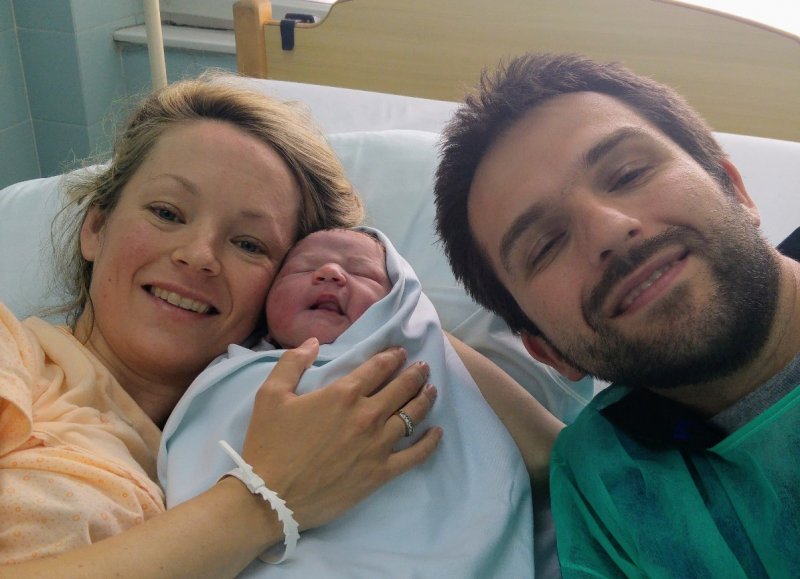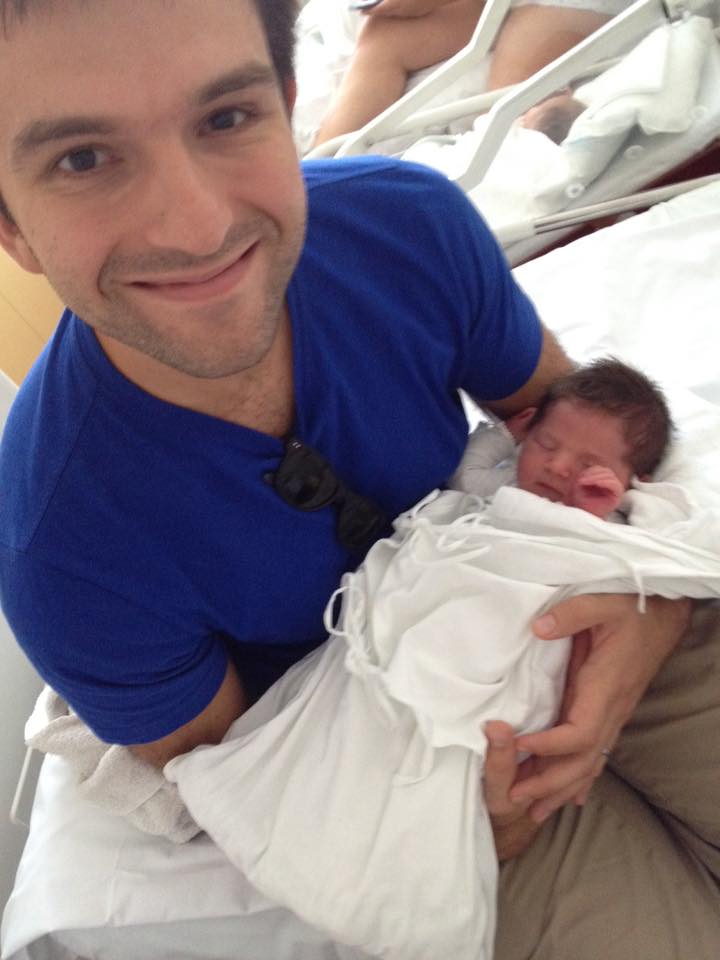What was the hospital experience going to be like? What kind of support would I have? Am I going to understand everything that’s going on? Who can be in the room with me? What will the prenatal care be like?
Some of you may even be "stuck" in Croatia because of border closures & canceled flights due to COVID-19. Maybe you were planning to travel back home to give birth, but realize that can't happen at the moment. Hopefully you'll find this post helpful!
Here I’ll outline a bit about what you can expect with check ups throughout your pregnancy, the process you need to go through to have your partner join you while giving birth, a few things you can expect in the moments after, the care and support you’ll receive in the days and weeks following, and finally the process for naming your baby and getting the birth certificate.
First off, a few details about prenatal check ups and maternity leave.
Regular Checkups & Ultrasounds:
In Croatia, you’ll have a regularly scheduled monthly appointment throughout your pregnancy, and by law, every woman has the right to a day off each month in order to attend these appointments.
At every regular check up, you’ll have an ultrasound, so around 9 ultrasounds throughout your pregnancy, which is great!
This was something I always looked forward to. Seeing my baby move around and watching how he/she was growing at each stage was amazing and reassuring.
Back home in Canada I believe they only do 2 ultrasounds; a dating ultrasound at about 6 weeks, and an anatomy scan around 20 weeks.
All in all, I was very happy with my prenatal care here in Zagreb, but I was very fortunate to have had pretty easy, uncomplicated pregnancies (gestational diabetes with my first, but no issues with the other two).
Maternity Leave:
Every woman has the right to start her maternity leave at least 28 days before her baby’s due date (by Croatian Law). I think this law is wonderful!
It allows plenty of time for nesting and resting in the weeks leading up to your baby’s birth (if it’s not your first child, though, there obviously won’t be too much resting going on ;)
The other great thing about the month off before your due date, is that if you happen to give birth a week or two early, you’ve at least had a couple weeks at home to get things in order, pack a bag, pick up a few things you might need for the baby, etc. (all of my babies came early - 3 weeks, 1 week and 2 weeks).
I know that in many other countries, women work up until the day they give birth (some by choice, some out of necessity), but this law really tries to give women at least a little time to take care of themselves and their unborn babies as they near the end of their pregnancies.
Maternity leave is 12 months for women, however, men are also entitled to 4 months paternity leave (if taken, this would shorten a woman’s leave to 10 months, which gives 14 months of total leave with both parents).
Giving Birth: Hospitals, Birth Plans and the Birthing “Box”
Hospitals for Giving Birth
I gave birth at Petrova Hospital all three times, which is the main hospital for “Giving Birth & Women’s Diseases” in Zagreb. It’s not a general hospital, it’s specifically dedicated to birth and women’s diseases.
This is great because there aren’t all of the contagious illnesses circulating around, like in general hospitals.
You can choose which hospital to give birth at, though. In the last couple weeks of your pregnancy, you’ll actually have all of your check ups right there at the hospital, instead of at your gynaecologist’s office.
They also have a private hospital (called Podobnik) where some expats (and locals) choose to have their babies.
The “Birthing Box”
The “box” is what they refer to as the dedicated “delivery” area in the labor ward, and it’s not as scary as it sounds.
When I was first told I’d give birth in the box, I wasn’t sure what to expect (and I was a little frightened, to be honest).
Luckily, I had a tour of the hospital while I was pregnant (which happens when you attend a *mandatory birthing class). It turns out, the box is just another name for a very well equipped space where all of the deliveries happen (so in other words, a delivery room).
*I say mandatory birthing class because if your partner wants to join you when you give birth, then he must attend the class with you. More on this in my next point.
Last point on the box - you typically only go there once your water has broken or your contractions are close together - basically when you’re getting close to delivering (again, a better - and less frightening - name might be “delivery room,” but oh well!)
Rules for the Box
Rule #1 - There is only one other person allowed in the box with you. It can be anyone you want, but it’s not a whole family affair like it’s become back home. Typically it’s the baby’s other parent.
Rule #2 - The person you’ve chosen to be in the box with you has to have attended a birthing class which covers the birthing process and what to expect. With the certificate of going to the class, your partner will receive a beautiful green apron and cap to wear while in the box with you on the day of the birth ;)
Giving Birth
Having only given birth in Zagreb, I have nothing to compare this to, just friends’ stories from back home, but I was very happy with each of my 3 experiences at Petrova Bolnica.
From what I’ve heard when comparing notes with my friends back home, is that in Croatia, there are fewer birthing options (example, with a ball, in a tub, on a chair etc.).
I know this is very important to some, but this didn’t matter to me. My only “birth plan” was to go to the hospital and get my baby out safely.
If you’re really set on a specific birth plan, it might be a good idea to check out the private hospital I mentioned above (Podobnik).
I’ll skip (most) of the gorey details of the actual birth, because well, I assume that’s pretty much standard everywhere. But I will comment on two of my three experiences at Petrova.
One was with the BEST doctor when I gave birth to my 10lb son, and one with the most amazing midwife when I gave birth to our youngest.
For my son: In the hospital, there were a few comments about how it’s likely I would end up giving birth via c-section because the baby was just so BIG. I was mentally preparing myself for that, but it was still a bit nerve-wracking since a c-section was another unknown.
As I said before, I had no birth plan, other than getting the baby out safely, so I was just trying to be relaxed and go with the flow.
There was something so magical and calming about him. He appeared at exactly the right moment and somehow carefully guided the baby through a few pushes and within about 10 minutes, my 10-pounder was out, no surgery required (but thank goodness for epidurals).
For my youngest: I had the most amazing experience with the birth of our youngest. This time a midwife took care of me right from the beginning through to delivery and she was great (I wish I remembered her name so I could mention it here). Here’s the story:
Since my previous labors were each about 12 hours, I was expecting the same with my third.
My contractions were getting pretty close together, but they weren’t painful yet, so I thought there’s no need to go rush to the hospital now. I’d rather stay at home than labor in the “box” for hours.
I called my mom back in Canada and told her how I think I’m in labor. She told me to rush to the hospital because at that point my contractions had jumped to about 2 minutes apart.
They still weren’t painful, though, so I was questioning whether or not to go.
My mom said, “Sarah, GO NOW! And take a blanket with you in case you give birth in the car!” I guess those words kind of hit me, so we called Ivan’s parents in the middle of the night to come pick up our two older kids.
Everything happened so quickly in the very early hours of the morning and when we got to the hospital, there was no time left for an epidural.
I had passed the point of no return and I was in a PANIC because I thought there’s absolutely no way I can give birth without a giant needle in my back to ease the pain.
I NEEDED one. I didn’t think I was strong enough, the pain was so intense.
The midwife definitely felt my nerves, my pain and my fear. Having delivered countless babies and having helped so many women through the same thing, she really understood and acknowledged how I felt.
Ivan was there for moral support, too, of course (and he was great), but midwives really know what’s going on, they get it.
I seriously didn’t think I could do it as my body was uncontrollably shaking through the pain, but she remained calm, reassuring, and comforting, and our baby arrived swiftly and safely.
Looking back, the whole experience was incredible.
Midwives generally take care of women through labor and delivery in the hospitals here, and doctors check in and are there when needed, of course. If your labor is uncomplicated, you’ll likely be with a midwife throughout.
In the Minutes & Hours After Giving Birth
Immediately after giving birth, they’ll place the baby on your chest for about 2 hours of skin to skin time. They’ll also immediately put a bracelet on you and the baby, with matching numbers.
Afterwards, they’ll take the baby for a quick bath, they’ll do a check up, and then they’ll bring him/her to your room where you’ll be for the next few days recovering.
The general rule is that for uncomplicated, natural deliveries and healthy babies, you’ll stay in the hospital for 3 days. For C-sections, you’ll stay for 5 days.
If the baby has jaundice or any other issues, you’ll stay longer with your baby until you’re both ready to go home, together.
Roommates
You’ll probably have roommates in the days spent recovering in the hospital, unless you opt for one of the few private rooms which may or may not be available at the time you give birth.
I wasn’t sure about this in the beginning, I thought I’d definitely want my own space.
In the end, I had roommates all three times and loved it. Roommates were other women to talk to and share stories and advice with, and I’m still friends with one of the roommates I had, in particular (turns out we live in the same neighborhood, so we still go for walks with our babies).
Also, I don’t know if this was on purpose or it was just by coincidence, but they seem to match up women in the same room based on if they’re first time moms, or if it’s their second/third/fourth baby.
In any case, roommates turned out to be a positive “concern.” Women who are going through the same thing at the same time act as great moral support (especially because there won’t be any visitors for the next few days…. Read on to my next point and I’ll explain).
Visiting Hours
|
Visiting hours are very strict, there’s no way around it. This is one thing I really disliked in the beginning, but I understand it now.
Visiting hours are about 30-60 mins per day (around 5pm from what I remember), and only one visitor is allowed in your room at a time. Oftentimes, the nurses will also bring all of the babies to the nursery for visiting hours, so no one can even see or hold the baby when they visit you in your room. I thought that surely my husband would be allowed into the room to see me any time, he’s more than just a visitor, after all. Wrong. Husbands/partners count as visitors and have to follow the strict visiting hours, too. This is something else that drove me crazy, but I get it, here’s why... |
1. Roommates. If you share a hospital room with two or three other women, and each one has visitors coming and going multiple times throughout the day, it doesn’t give you much peace or privacy.
2. There aren’t any curtains between beds in these rooms, either, so the fewer people in the room, the better. Trust me, you don’t want someone else’s husband or friend in there while they’re checking how your body is healing.
3. Germs (and this is even before COVID-19!). They want less exposure to germs for the babies. As I mention, oftentimes (especially in flu season), babies are brought out of the room during visiting hours to further protect them from any outside viruses.
I thought the rules were ridiculously strict in the beginning, but I understood them by the end of it, and really appreciated that they were in place.
Nurses
On the recovery ward, the nurses work around the clock to make sure you and baby are ok (as I’m sure is the case in all hospitals around the globe). But here are a few pluses to staying in the hospital for a few days after birth vs. just a few hours as is the case back in Canada.
1. It’s reassuring (especially as a first time mom) to have a few days where you know your baby is constantly being monitored and everything is ok
2. You can ask the nurses questions 24/7
3. You’ll have 24/7 help with breastfeeding if you want it / need it. They'll come and help the baby latch properly and give you some pointers
4. The nurses change all of your baby’s diapers while you’re in the hospital!
5. If you want to get a few hours of sleep through the night, you can ask the nurses to bring the baby to the nursery.
This last point was amazing. If you want your baby by your side the whole time, no problem. However, if you want to get a few hours of sleep, now’s your chance! Take advantage of a couple nights to rest before the real sleeplessness starts when you get home.
I remember with my first baby, I labored all day and gave birth in the evening. Later that night, they came to take her to the nursery so I could get some rest, and I wasn’t thrilled...I was even kind of angry about it.
I was too excited, still full of adrenaline, I just wanted to stay awake and stare at her all night long. There was no way I could sleep.
With my second and third, though, I definitely asked the nurses for a few hours of rest each night because I knew the exhaustion that was waiting for me as soon as I got home. It’s great to know if you need the rest, you can have it. If you don’t, then that’s fine, too!
Patronazna Sestra (Nurse for Home Visits)
In the days and weeks after you get home from the hospital, a nurse will make a few home visits to check in on the baby (and you, if you have any concerns).
She’ll weigh the baby to make sure he or she is gaining properly, answer any questions you may have, and just act as an extra support in case you may need it. It’s reassuring to have someone come and continue to monitor your baby’s progress for the first couple weeks at home.
Birth Certificates & Naming Your Baby
You won’t actually receive your baby’s birth certificate in the hospital, nor will you give your baby a name there (officially).
You can obviously start calling your baby the name you’ve chosen whenever you want, but you won’t officially declare your baby’s name until you go to the “Maticni Ured Rodenih” in the days following your baby’s birth.
To name your baby, you and your partner must go together to the Maticni Ured Rodenih (government offices), which is also where you’ll receive his or her birth certificate (right after you give his/her name).
They don’t allow just one parent to go name the baby on behalf of both parents (to make sure there are no surprises for anyone), so think of it as your first family outing.
Conclusion
I’m sure there are countless similarities between the whole process of birth and hospital care here in Croatia, and in other countries around the world, but there are certainly some differences.
There are so many things I was sure I wouldn’t like about giving birth here, which actually became the things I loved most about the whole process.
Letting women rest a month before birth sounds very “human” to me, as does a year long maternity leave.
I didn’t like the idea of having to stay in the hospital for days afterwards, I thought I’d want to go home in the immediate hours afterwards.
I was upset when the nurses tried to let me rest the first night in the hospital. I thought having roommates sounded awful. And visiting hours? What visiting hours!
Later, I was thankful for being able to rest in the hospital, and have 24/7 help if needed. I appreciated being able to catch a few hours of sleep through the night before heading home and starting the real sleepless nights.
I loved feeling safe in the hospital during flu season, and not having people coming and going around my newborn.
Things are a bit different here than in North America, but I really appreciated some of the differences and felt very supported throughout all of my pregnancies, while giving birth, and in the days and weeks afterwards, especially.
Going through everything for the first time feels so unknown, but even more so when you’re not in your “home” country. I hope others who find themselves in this situation can find some comfort in this post!
If you have any specific questions, let me know, I’d be happy to answer!
|
Sarah Cosic
Royal Croatian Tours - Specializing in custom made, luxury trips throughout Croatia. We offer exclusive experiences all over the country, and we’re passionate about providing you exceptional service that goes above and beyond for your tailor made vacation! Send us an email or give us a call to start planning today! |
- 25 Strange Things Croatians Do (And Would Never Do)!
- Croatian Culture, Etiquette & Social Norms: A Complete Guide!
- My Kids Don't Speak English: Raising Bilinguals is Tough!
- 15 Places in Croatia You've Probably Never Heard Of!
- 50 Insanely Spectacular Photos of Croatia: Start Packing!
- Croatia’s Best 20 Beaches: Sandy, Pebbly & Hidden Gems
- Is Croatia Safe? Read Our 20 Useful Safety Tips for Tourists
- 5 Reasons Croatian Grannies are Cuter than Kittens
- 8 Reasons You Should Never Swim in the Adriatic
- Top 10 Day Trips From Zagreb, Within 1hr Drive
- Croatian Money: KN or EURO, Exchanging $, and Daily Costs
- How I Learned to Speak Croatian as an Adult (in 7 Steps)
- Driving in Croatia (A Helpful Guide With Practical Tips)
- 38 Local Tips & Mistakes to Avoid When Traveling to Croatia
- Travel to Croatia With a Toddler or Baby (From Experience!)
- Tipping in Croatia: A Complete Guide With Suggested Amounts!
-
20 Croatian Habits Everyone Should Adopt

